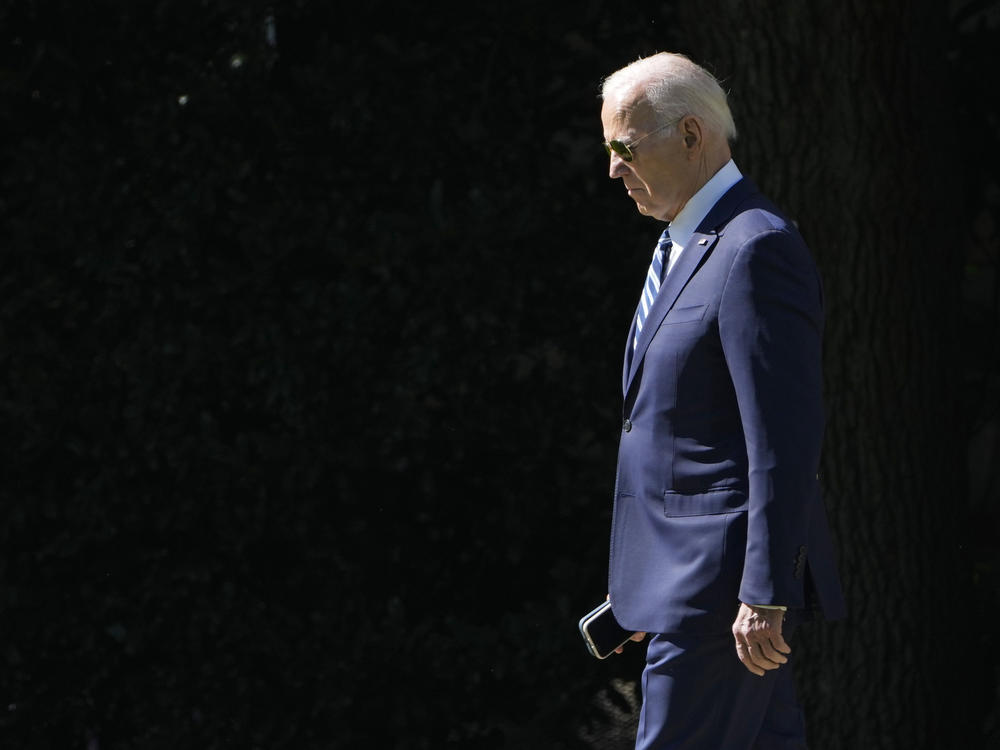Section Branding
Header Content
Biden made promises to Israel and Ukraine. To keep his word, he needs Congress
Primary Content
For President Biden, the international coalition he brought together to support Ukraine as it defends itself against Russia is a point of pride, something made possible by his decades of foreign policy experience.
He has promised allies — and Ukraine itself — that the United States will back them "as long as it takes." And last week, he made similar assurances to Israel after Hamas attacked, killing more than a thousand people.
"We stand with Israel. And we will make sure Israel has what it needs to take care of its citizens, defend itself, and respond to this attack," Biden said.
But keeping those promises will take billions in funding from Congress — funding that is far from assured as the Republican-led House of Representatives struggles to overcome factional strife to name a speaker.
Without a speaker, the House can't vote on anything. And a small but powerful group of House Republicans has balked at providing more funding for Ukraine.
"The combination of challenges to our democracy, having a dysfunctional Congress and then add to that that we're now part of two wars going on in Ukraine and Israel," said Leon Panetta, who served in the Obama and Clinton administrations, including as CIA director and defense secretary.
"It's not just the credibility of Joe Biden. It's the credibility of the United States. And the last thing this country needs to do in a dangerous world is send our adversaries a message of weakness," Panetta told NPR.
The White House will include Ukraine funding as part of a package, with support for Israel
The White House has said it will soon run out of money to help Ukraine. It originally asked Congress for $24 billion to help Ukraine make it through the end of 2023. But that request wasn't included in a stop-gap spending bill that runs until Nov. 17.
Its next request is expected to be bigger, to help Ukraine defend itself into 2o24. And it will be paired with money for Israel, and possibly other priorities. Details of the funding request — known as a supplemental — have been kept under wraps, although administration officials on Friday were making the case for the funding with Hill leaders in private briefings.
"Time is not on our side," National Security Council spokesman John Kirby told reporters. "The runway is not forever here, in terms of not only operations on the ground in Israel and Ukraine, but our ability to continue to provide security assistance to both partners."
Biden told CBS' 60 Minutes that the United States can support both countries at the same time. "We're the United States of America for God's sake, the most powerful nation in the history — not in the world, in the history of the world," he said. "We have the capacity to do this and we have an obligation to ... And, if we don't, who does?"
Biden said he was going to give a major address on Ukraine. But now he's grappling with another crisis
Public support for assistance to Ukraine has slipped since the early days of the war in 2022. Biden had said he planned to give a major address to Americans to explain why he thinks it needs to continue — but then the Israel attack happened, and his public remarks have been focused on the new crisis.
Most Americans say the United States should publicly support Israel, but the latest NPR/PBS NewsHour/Marist poll shows Biden — who has expressed a strong pro-Israel stance — has not benefited politically from that.
Heather Conley, president of the German Marshall Fund of the United States, said it's long past time for Biden to be doing more to explain to the public why they need to back Ukraine.
"This is a time to make sure the American people understand the gravity of the situation, the investment the United States needs to make, and to make sure everyone understands the stakes that are in place," Conley said.
Conley said the Israel crisis gives Biden another chance to explain that investing now could prevent bigger, more expensive crises down the road.
"If Ukraine is not successful in restoring its territorial integrity — if Israel struggles to defend itself — this opens the floodgates, if you will, for other countries to take advantage of the weakness, to also take advantage, to express grievance. And that price tag gets higher," Conley said.
Biden has a lot on the line, politically
Being a leader on the world stage is a big part of President Biden's political identity, raising the stakes for him in this moment as the 2024 presidential election draws closer.
Big foreign policy failures can hurt presidents politically, said Peter Feaver, a political scientist at Duke University who has served in both the Clinton and George W. Bush administrations.
That means Biden has a lot riding on Ukraine's success — and that requires Congress to continue funding military aid, Feaver said.
"If that success is replaced by a collapse in Ukraine because we stop supporting Ukraine, then the Biden foreign policy record looks much much more negative," Feaver said.
Copyright 2023 NPR. To see more, visit https://www.npr.org.



